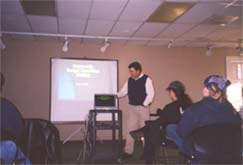A community budget committee meeting was held on Jan. 14 in the Founders Gallery to discuss the progress the budget committee has made since the last community meeting on Oct. 3.
The committee is working to reduce the college’s draw on the endowment (which spiked to 14 percent in 2001 and stood at nine percent in 2003) as well as toward balancing the operating budget by the 2005-2006 academic year.
“I believe the budget committee made a firm commitment not to balance the budget unfairly on the backs of one group or another,” budget committee chairman Raymond Johnson said. “The committee is attacking the problem from both the revenue and expense sides, using many approaches,”
College president Kent Chabotar also believes the burden of balancing the budget is being fairly distributed.
“We have reduced departmental operating budgets, slightly trimmed salary rises for next year, asked the trustees for a special funding commitment, increased enrollment without comparable increases in non-faculty staff, and asked folks on campus generally to do more with less,” he said.
In addition, the committee has proposed a 6.5 percent increase in traditional student tuition and fees and a proposed five percent increase in CCE tuition and fees.
This news prompted a flurry of questions from the audience.
“Why will CCE tuition be increasing less than traditional tuition?” Community Senate secretary Laura Myerchin asked.
“The adult education market is very price sensitive because there is stronger competition among adult programs in the area,” said Johnson, pointing to schools such as High Point University, North Carolina A&T, and the University of North Carolina at Greensboro as the college’s major competitors in the adult education market.
“Adult students will respond with their feet (if their tuition is significantly increased),” Johnson said.
Chabotar reiterated the importance of the college being market sensitive.
“Given a target of having student fees around the middle of the competition, we had more room to increase traditional student fees since we were toward the bottom in price compared to CCE, where we were already in the middle,” Chabotar said. In addition, “much of the state aid that the College receives for CCE students subsidizes traditional student financial aid and lowers what students and families actually pay.”
“If there truly is a need to increase tuition 6.5 percent for traditional students then I am all for it,” Community Senate President Floyd McKissick said. “I just hope that students will be able to really see some positive results from this increase.”
Some in attendance expressed concern that despite tuition increases, campus resources would be overly taxed by the 1,000 total CCE students (50 more than were enrolled in Oct. 2003) and 328 new first-years projected to enroll for the 2004-2005 academic year.
“Will we put a cap on the number of CCE students who can enroll?” Charlie White, the Director of Information Services, asked.
“We are not trying to cap enrollment now,” Phil Manz, the vice president and chief financial officer of the college and a budget committee member, said. There is no strategic plan guiding the budget committee toward an appropriate blend of traditional, CCE, and early college students; therefore the committee instead adheres to a simple set of guidelines that prioritizes budgetary spending: the long- term viability of the college, academic programs, student life and admissions, employee salaries and wages.
In the future, a strategic long-range plan currently being developed by a separate committee will provide a set of values and goals for the college that will guide the decisions of the budget committee and other campus decision-makers.
In the meantime, however, students and faculty alike are concerned about the ramifications of a continually growing CCE program.
“Main campus students can’t get into the classes they want and don’t get the value added they expect (because they are in competition with CCE students for campus resources),” philosophy professor Lisa McCleod said. “We seem to be running up against the wall of what our resources can handle.”
“We are working toward determining the target number for the size of the college, the breakdown of the types of students, and the implications and burden of each on campus resources,” Chabotar said. However, the present situation does not seem to indicate that that capacity has been reached.
“Getting into classes has always been difficult for first-year students because they register last,” Vice President and Academic Dean Adrienne Israel said. “Getting into H.P. (historical perspectives) courses has been a particular problem from the time when their were 50 CCE students, to when there were 500, to now … CCE students have difficulty getting the courses they need as well.”
In addition, increased resources are slated to accompany the tuition hike. In the coming years more full-time, tenure-track faculty will be hired, Founders Hall and Duke Hall will be renovated, and varsity athletic programs will be added.
The budget committee plans to finalize its recommendations and turn the budget over to Chabotar for review by the end of the month. Chabotar will present the budget to the board of trustees on Feb. 21.

